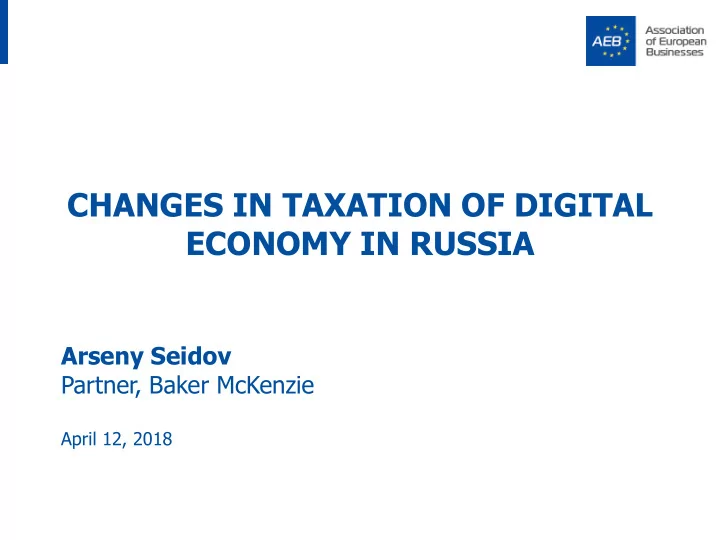

CHANGES IN TAXATION OF DIGITAL ECONOMY IN RUSSIA Arseny Seidov Partner, Baker McKenzie April 12, 2018
VAT regime on ESS - Current rules Current VAT regime on electronically supplied services (“ ESS ”) applies since January 1, 2017 List of ESS rendered through the Internet Place of supply is determined at customer location Criteria for determining customer location Place of residence Residence of bank or e-payment operator IP address Phone number No VAT registration for foreign B2B suppliers, but VAT registration for B2C suppliers For B2B supplies Russian companies, including individual entrepreneurs are required to act as tax agents, i.e. withhold VAT on a reverse-charge basis For B2C supplies foreign suppliers of ESS calculate and pay VAT themselves
VAT regime on ESS - New rules New regime on ESS comes into effect on January 1, 2019 Elimination of the reverse-charge mechanism for B2B supplies Tax agents: Russian and foreign intermediaries operating under agency or similar and making settlements directly with customers For B2B supplies and B2C supplies foreign suppliers (including foreign intermediaries) are required to: calculate VAT at the rate of 15.25% submit VAT returns pay VAT on a quarterly basis Tax registration for both B2C suppliers and B2B suppliers Documents required for input VAT recovery document confirming payment to the foreign company (with a VAT amount indicated as a separate line item) agreement with indicated VAT amount, TIN and KPP of the foreign company National payment system operators (money transfer operators, payment agents and etc.) are not considered tax agents (change effective as of January 1, 2018)
VAT regime on ESS – Impact on Suppliers Foreign suppliers of electronic services in B2B market (not registered in Russia for B2C supplies) will be required to tax register in Russia by February 15, 2019 Foreign suppliers will be required to (i) collect, report and pay VAT on all their sales to Russian customers, and (ii) maintain information on the locations of such customers Foreign companies with just one ESS transaction to a Russian consumer will be formally required to register, calculate and pay VAT Same extends to recharge of HQ (ESS) costs to Russian affilaites (e.g. costs on global software licenses) No turnover threshold for Russian tax registration What if the transaction is VAT-exempt (e.g. software use license / sublicense)? What if transaction provides for both ESS and regular services for a bundled fee? Tax registration under the VAT regime may increase long-term exposure to general tax audit and virtual permanent establishment risks
VAT regime on ESS – Impact on Customers Input VAT recovery - criteria Foreign supplier is tax registered in Russia Necessary documents (e.g. contact with TIN and KPP of the foreign supplier) Due diligence Does the customer have to check whether the foreign supplier is tax registered in Russia for purposes of VAT regime on ESS? Should it request any supporting documents? Role of “defense file” and burden of proof No voluntary mechanism for Russian companies to act as tax agents If the supplier lacks Russian tax registration and/or has no supporting documents, should the Russian customer: pay VAT to the foreign supplier and claim VAT for recovery or withhold and pay VAT to the budget and recover the VAT?
Current trends (1) - VAT on online cross- border sale of goods The Draft Law was prepared in March 2017 , but has been neither published for official discussion, nor introduced into the Russian State Duma Currently, the Russian Finance Ministry considers two initiatives: to reduce the threshold for duty-free import by individual persons via international mailings (Main Directions for Budget, Tax and Customs Policy in 2018 and planned period of 2019-2020 years) to introduce Russian VAT on online retail trade Draft Law is still undergoing intragovernmental approval (several ministries involved) In December 2017, some market players appealed to the Russian Prime Minister with a request to continue work on the initiative
Current trends (2) - Digital Economy project In December 2017 the Russian Government approved the action plan for developing tax incentives to implement the Digital Economy project (the “ Plan ”) and make the Russian tax system more competitive The Plan provides for several initiatives to be enacted in Dec 2018 – Jan 2019 1) R&D and Patent Box Reduced tax rate for disposal of IP rights Multiplying ratio to the expenses for R&D 2) Tax incentives for “business angels” Personal income tax deduction for individuals investing in a high-risk venture market 3) Tax residency rules for highly qualified specialists Possible criteria: minimum level of the annual income, qualification requirements and the number of days of actual stay in Russia 4) VAT on electronic services Input VAT recovery for export of digital and IT services Favorable tax treatment for Russian online retailers
Current trends (3) – Cryptocurrency taxation In late March 3 draft laws concerning digital economy were introduced to the Russian State Duma: draft law introducing the concept of digital rights and digital money in civil law draft law on digital financial assets (cryptocurrency and token) draft law on alternative methods of attracting investments (crowdfunding) Under civil regulation digital money can be considered as a legal tender only if it is established by special legislation. However, cryptocurrency and token are not considered as a means of payment under draft law on digital financial assets Transactions involving exchange of tokens for rubles or foreign currency may take place only through a digital financial asset exchange operator. The Bank of Russia is to establish a list of other possible transactions with digital financial assets The Russian Ministry of Finance confirms that the legal regime of the cryptocurrency is still uncertain . However, any income from profit-making activity (except explicitly excluded form taxation) is subject to taxation ( Letters of the Russian Ministry of Finance No. 03-03-06/1/8061, dated February 9, 2018 on cryptocurrencies and No. 03-04- 05/66994, dated October 13, 2018 on Bitcoins). VAT aspects of transfer of digital assets
Arseny Seidov Partner Moscow | Russia T: +7 495 787 2700 arseny.seidov@bakermckenzie.com Q&A
Recommend
More recommend